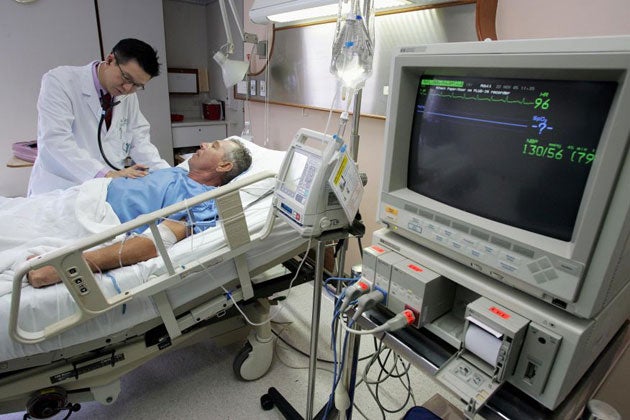New heart scan could identify ‘ticking time bomb’ patients at highest risk of attack
After 20 years of research, scientists can now accurately pinpoint areas of fatty plaque build-up in and around the heart

A new kind of heart scan could be used to identify “ticking time bomb” cases where people are at the highest risk of having a heart attack.
Doctors say the use of new scanning techniques, so far only tested on patients who have already suffered attacks and survived, could soon make a “massive difference” in the way we try to track and prevent deadly heart disease.
The test has been developed by a research team at the University of Edinburgh, and uses a combination of radioactive tracers and high resolution images of the heart and surrounding blood vessels to identify areas of dangerous fatty build-up.
In a study on 40 patients who had recently suffered heart attacks, the scan accurately found the plaque causing the blockage in 37 of them.
It is the first time a scan has ever been able to identify specific “danger zones” in this way – but more research is needed before doctors can use the discovery to find plaque before, rather than after, an attack.
Cardiologist Dr Marc Dweck told the BBC that if the scan or similar ones proved successful it would make a “massive difference”.
He said: “Heart attacks are the biggest killer in the Western world and there is no prior warning, the first time people know about heart disease is when they have a heart attack.
“If we can treat and stabilise the plaques then we might be able to prevent heart attacks and stop people dying.
“I suspect not all plaques detected will cause a heart attack,” he said. “But it could be useful for identifying high risk patients who need aggressive therapy.”
Professor Peter Weissberg, medical director at British Heart Foundation (BHF), said: “Being able to identify dangerous fatty plaques likely to cause a heart attack is something that conventional heart tests can't do.
“This research suggests that PET-CT scanning may provide an answer - identifying ‘ticking time bomb’ patients at risk of a heart attack.
“Nearly 20 years of BHF-funded research has led us to this point. We now need to confirm these findings, and then understand how best to use new tests like this in the clinic to benefit heart patients.”
There are more than 100,000 heart attacks in the UK each year, according to the BHF.
Heart and circulatory diseases cause more than a quarter of all deaths in the UK, around 160,000 a year.
Join our commenting forum
Join thought-provoking conversations, follow other Independent readers and see their replies
Comments
Bookmark popover
Removed from bookmarks